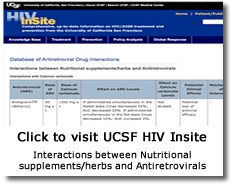Food, Drug, and Herb Interactions with Antiretroviral Drugs
Antiretoviral drugs can interact
with food, drugs, and nutritional supplement. Patients
must informed which of their drugs should be taken on an empty stomach, which should
be taken with food, and specific foods that may affect drug effectiveness. It’s
important for nurses to review instructions with patients, and to emphasize that
if HIV drugs are not taken correctly with regard to meals, drugs may be up to
80% less effective. Even
a short exposure to a suboptimal level of an HIV drug can lead to irreversible
viral resistance, and significantly decrease the chance that the patient’s
HIV infection can be controlled.
Drug-drug interactions are
more common and potentially more severe with protease inhibitors than with other
classes of antiretroviral drugs.  Drug-drug interactions can reduce the effectiveness,
and in some cases, can cause life-threatening reactions. There are many drugs
that can reduce the effectiveness of antiretroviral drugs. Because some HIV
drugs interfere with enzymes that normally metabolize drugs, the serum concentration
of many other drugs can be increased.
Drug-drug interactions can reduce the effectiveness,
and in some cases, can cause life-threatening reactions. There are many drugs
that can reduce the effectiveness of antiretroviral drugs. Because some HIV
drugs interfere with enzymes that normally metabolize drugs, the serum concentration
of many other drugs can be increased.
Many individuals in the
U.S. take herbal medicines. However, patients may not consider herbal remedies
as "medicines" and may not think of telling their health care providers
that they are taking them. Commonly used substances such as garlic supplements
and St. John’s wort can affect the serum levels of some HIV drugs.
Instant Feedback:
It is vital that medications be taken correctly with regard to meals.
© RnCeus.com
 Drug-drug interactions can reduce the effectiveness,
and in some cases, can cause life-threatening reactions. There are many drugs
that can reduce the effectiveness of antiretroviral drugs. Because some HIV
drugs interfere with enzymes that normally metabolize drugs, the serum concentration
of many other drugs can be increased.
Drug-drug interactions can reduce the effectiveness,
and in some cases, can cause life-threatening reactions. There are many drugs
that can reduce the effectiveness of antiretroviral drugs. Because some HIV
drugs interfere with enzymes that normally metabolize drugs, the serum concentration
of many other drugs can be increased.